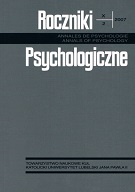Wiedza i wyobraźnia a zjawisko fałszywej pamięci
Knowledge and imagination, and the false memories phenomenon
Author(s): Justyna OlszewskaSubject(s): Psychology
Published by: Towarzystwo Naukowe KUL & Katolicki Uniwersytet Lubelski Jana Pawła II
Keywords: memory; imagination; recall; recognition
Summary/Abstract: The purpose of this study was to verify whether imaginative vs. non-imaginative conditions are crucial for creating false memories, particularly in a situation in which people try to separate current information from their general knowledge. At present, many researches studying memory, focus on the false memories phenomenon. The studies concerning episodic memory suggest the influence of imagination when one tries to implement never-happened events into memory (Pezdek, Hodge, 1999; Hyman, Pentland, 1996). The article reports results of 2 experiments. Experiment 1 concerned the process of information recall whereas experiment 2 – recognition. In each experiment two instructions – imaginative and non-imaginative were used both on the level of reading and answering questions concerning current information. The context of general knowledge was created by text 1 and the current information was delivered by a contents-related text 2. However, text 2 did not contain explicit information and participants were asked to read it only once. The results have shown the influence of the imaginative vs. non-imaginative instruction on memorizing current information. Moreover, the differences between the recall and the recognition groups were demonstrated. This study showed that imaginative vs. non-imaginative instruction affects false memories creation, especially when we try to separate the general knowledge from current information.
Journal: Roczniki Psychologiczne
- Issue Year: 10/2007
- Issue No: 2
- Page Range: 75-88
- Page Count: 14
- Language: Polish

